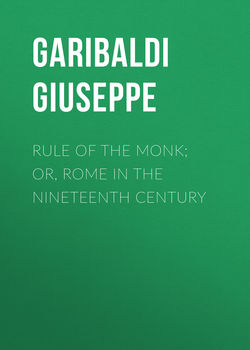Читать книгу Rule of the Monk; Or, Rome in the Nineteenth Century - Garibaldi Giuseppe - Страница 9
PART THE FIRST
CHAPTER VIII. THE MENDICANT
ОглавлениеEighteen years had rolled by since the horrible murder of La Signora Virginia related in the last chapter. On the same piazza which Father Ignazio had traversed that dark night stood a mendicant, leaning moodily, yet not without a certain grace, against a column. It was February, and the beggar lad was apparently watching the setting sun. The lower part of his face was carefully concealed in his cloak, but from the little that could be discerned of it, it seemed decidedly handsome; one of those noble countenances, in fact, that once seen, impresses its features indelibly on the beholder's memory. A well-formed Roman nose was well set between two eyes of dazzling blue; eyes that could look tender or stem, according to the possessor's mood. The shoulders, even under the cloak, showed grandly, and could belong only to a strength which it would be dangerous to insult, or rashly attack. Poor as its garb was, such a figure would be eagerly desired by a sculptor who sought to portray a young Latin athlete.
A slight touch upon the shoulder caused the young mendicant to turn sharply; but his brow cleared as he welcomed, with a beaming smile, Attilio's familiar face, and heard him saying, in a lively tone, "Ah! art thou here, brother?" And although no tie of blood was between them, Attilio and Muzio might, indeed, have been mistaken for brothers, their nobility of feature and brave young Roman bearing being so much alike.
"Art thou armed?" inquired Attilio.
"Armed!" repeated Muzio, somewhat disdainfully. "Assuredly; is not my poniard my inheritance, my only patrimony? I love it as well as thou lov'st thy Clelia, or I mine own. But love, forsooth," continued he, more bitterly; "what right to love has a beggar – an outcast from society? Who would believe that rags could cover a heart bursting with the pangs of a true passion?"
"Still," replied Attilio, confidently, "I think that pretty stranger does, in truth, love thee."
Muzio remained silent, and his former gloomy expression returned; but Attilio, seeing a storm arising in his friend's soul, and wishing to avert it, took him by the hand, saying gently, "Come."
The young outcast followed without proffering a word. Night was rapidly closing in, the foot passengers were gradually decreasing in number, and few footfalls, except those of the foreign patrols, broke the silence that was stealing over the city.
The priests are always early to leave the streets – they love to enjoy the goods of this world at home after preaching about the glories of the next, and care little to trust their skins in Rome after dark. May the day soon come when these mercenary cut-throats are dispensed with!
"We shall be quit of them, and that before long," answered Attilio hopefully, as they descended the Quirinal, now called Monte Cavallo, the site of the famous horses in stone, chefs-d'ouvre of Grecian art.
Pausing between two of these gigantic effigies, the young artist took from his pocket a flint and steel and struck a light, the signal agreed upon between him and the three hundred, some of whom had agreed to help him in a bold attempt to release Manlio from his unlawful imprisonment.
The signal was answered immediately from the extreme end of the Piazza; the two young men advanced towards it, and were met by a soldier belonging to a detachment on guard at the palace, who conducted them through a half-concealed doorway near the principal entrance, up a narrow flight of stairs into a small room generally used by the commander of the guard; here he left them, and another soldier stepped forward to receive the pair, who, after placing chairs for them at a table, on which burned an oil-lamp, flanked by two or three bottles and some glasses, seated himself.
"Let us drink a glass of Orvieto, my friends," said the soldier; "it will do us more good on a bitter night like this than the Holy Father's blessing," handing them each, as he spoke, a goblet filled to the brim.
"Success to your enterprise!" cried Muzio.
"Amen," responded Attilio, as he took a deep draught. "So Manlio has been brought here," said he, addressing Dentato, the sergeant of dragoons, for such was the name of their military friend..
"Yes; he was locked up last night in one of our secret cells, as if he had been the most dangerous of criminals, poor innocent! I hear he is to be removed shortly," added Dentato, "to the Castle of St. Angelo."
"Do you know by whose order he was arrested?" inquired Attilio.
"By the order of ins Eminence the Cardinal Procopio, it is said, who is anxious, doubtless, to remove all impediments likely to frustrate his designs upon the Pearl of Trastevere."
As Dentato uttered these words, a sudden tremor shook the frame of Attilio. "And at what hour shall we make the attempt to liberate him?" he hissed, as his hand clenched his dagger.
"Liberate him! Why, we are too few," the soldier replied.
"Not so," continued Attilio. "Silvio has given his word that he will be here shortly with ten of our own, and then we shall have no difficulty in dealing with these sbirri and monks." After a pause, Dentato responded, "Well, as you are, then, determined to attempt his release to-night, we had better wait a few hours, when jailers and director will be asleep, or under the influence of their liquor. My lieutenant is, fortunately, detained by a delicate affair at a distance, so we will try it if your friend turns up." Before he could well finish his speech, however, Dentato was interrupted by the entrance of the guard left at the gate, announcing the arrival of Silvio.
